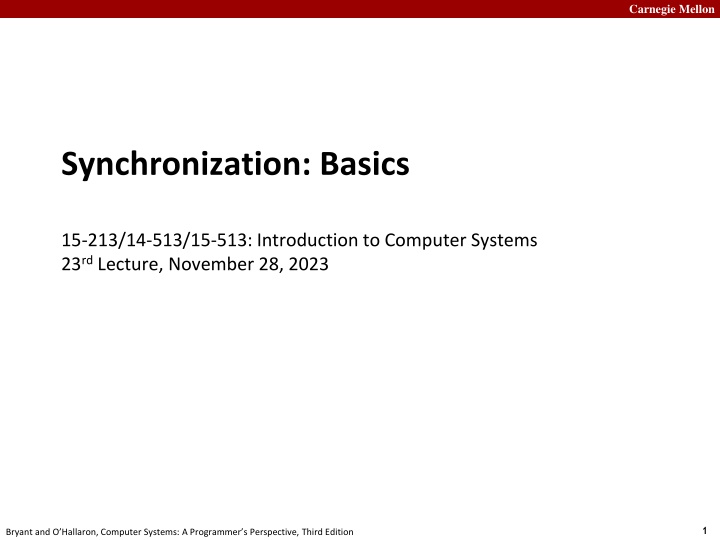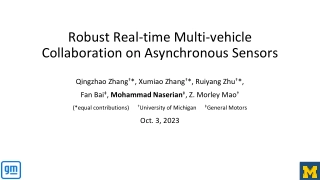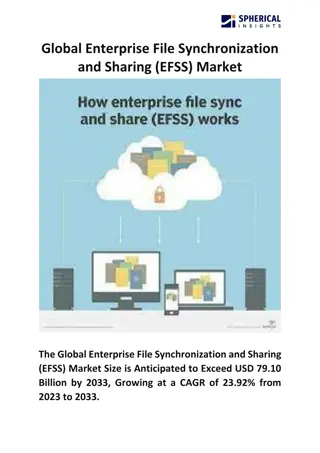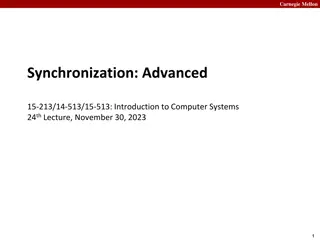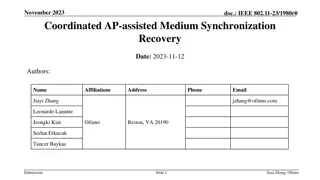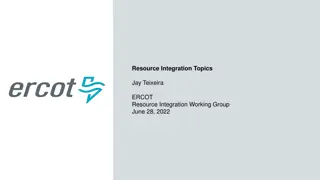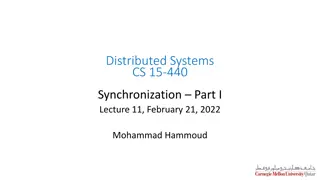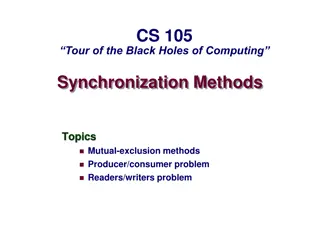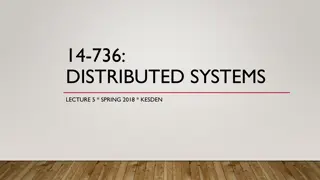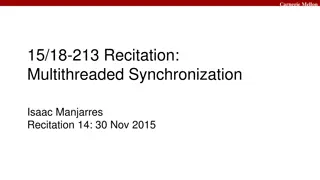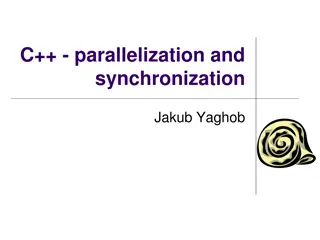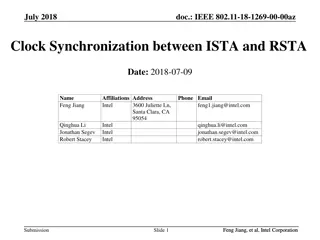Synchronization: Basics
In this lecture on computer systems, delve into the fundamentals and intricacies of synchronization in Carnegie Mellon's course. Learn about the basics, structure, and components of computer systems from the expert authors Bryant and O'Hallaron. This detailed guide covers concepts crucial for programmers and provides an extensive introduction to computer systems. Gain insights into hardware and software aspects, enabling a comprehensive understanding of the field.
Download Presentation

Please find below an Image/Link to download the presentation.
The content on the website is provided AS IS for your information and personal use only. It may not be sold, licensed, or shared on other websites without obtaining consent from the author.If you encounter any issues during the download, it is possible that the publisher has removed the file from their server.
You are allowed to download the files provided on this website for personal or commercial use, subject to the condition that they are used lawfully. All files are the property of their respective owners.
The content on the website is provided AS IS for your information and personal use only. It may not be sold, licensed, or shared on other websites without obtaining consent from the author.
E N D
Presentation Transcript
Carnegie Mellon Synchronization: Basics 15-213/14-513/15-513: Introduction to Computer Systems 23rdLecture, November 28, 2023 1 Bryant and O Hallaron, Computer Systems: A Programmer s Perspective, Third Edition
Carnegie Mellon More Final Exam Logistics Make-up final exam session Monday 18 December Location and time TBD Final exam review session: not yet scheduled If you have disability accommodations Make sure they re on file with the disabilities office Also fill out the form below You will take the exam at the Disability Resources Testing Center (5136 Margaret Morrison Street); do not go to Posner Need any sort of adjustment to exam logistics? https://piazza.com/class/llpgaho5sjp63w/post/2195 More details: https://www.cs.cmu.edu/~213/exams.html 3 Bryant and O Hallaron, Computer Systems: A Programmer s Perspective, Third Edition
Carnegie Mellon Today Threads review Sharing and Data Races Fixing Data Races Mutexes Semaphores Atomic memory operations 4 Bryant and O Hallaron, Computer Systems: A Programmer s Perspective, Third Edition
Carnegie Mellon Traditional View of a Process Process = process context + code, data, and stack Process context Code, data, and stack Stack Program context: Data registers Condition codes Stack pointer (SP) Program counter (PC) SP Shared libraries brk Run-time heap Read/write data Read-only code/data Kernel context: VM structures Descriptor table brk pointer PC 0 5 Bryant and O Hallaron, Computer Systems: A Programmer s Perspective, Third Edition
Carnegie Mellon Alternate View of a Process Process = thread + (code, data, and kernel context) Thread (main thread) Code, data, and kernel context Shared libraries Stack brk SP Run-time heap Read/write data Read-only code/data Thread context: Data registers Condition codes Stack pointer (SP) Program counter (PC) PC 0 Kernel context: VM structures Descriptor table brk pointer 6 Bryant and O Hallaron, Computer Systems: A Programmer s Perspective, Third Edition
Carnegie Mellon A Process With Multiple Threads Multiple threads can be associated with a process Each thread has its own logical control flow Each thread shares the same code, data, and kernel context Each thread has its own stack for local variables but not protected from other threads Each thread has its own thread id (TID) Thread 1 (main thread) Shared code and data Thread 2 (peer thread) shared libraries stack 1 stack 2 run-time heap read/write data read-only code/data Thread 1 context: Data registers Condition codes SP1 PC1 Thread 2 context: Data registers Condition codes SP2 PC2 0 Kernel context: VM structures Descriptor table brk pointer 7 Bryant and O Hallaron, Computer Systems: A Programmer s Perspective, Third Edition
Carnegie Mellon Don t let picture confuse you! Thread 1 (main thread) Shared code and data Thread 2 (peer thread) shared libraries stack 1 stack 2 run-time heap read/write data read-only code/data Thread 1 context: Data registers Condition codes SP1 PC1 Thread 2 context: Data registers Condition codes SP2 PC2 0 Kernel context: VM structures Descriptor table brk pointer Bryant and O Hallaron, Computer Systems: A Programmer s Perspective, Third Edition Memory is shared between all threads 8
Carnegie Mellon Today Threads review Sharing and Data Races Fixing Data Races Mutexes Semaphores Atomic memory operations 9 Bryant and O Hallaron, Computer Systems: A Programmer s Perspective, Third Edition
Carnegie Mellon Shared Variables in Threaded C Programs Question: Which variables in a threaded C program are shared? The answer is not as simple as global variables are shared and stack variables are private Def: A variable x is shared if and only if multiple threads reference some instance of x. Requires answers to the following questions: What is the memory model for threads? How are instances of variables mapped to memory? How many threads might reference each of these instances? 10 Bryant and O Hallaron, Computer Systems: A Programmer s Perspective, Third Edition
Carnegie Mellon Threads Memory Model: Conceptual Multiple threads run within the context of a single process Each thread has its own separate thread context Thread ID, stack, stack pointer, PC, condition codes, and GP registers All threads share the remaining process context Code, data, heap, and shared library segments of the process virtual address space Open files and installed handlers Thread 1 (private) Thread 2 (private) Shared code and data stack 1 stack 2 shared libraries Thread 1 context: Data registers Condition codes SP1 PC1 Thread 2 context: Data registers Condition codes SP2 PC2 run-time heap read/write data read-only code/data 11 Bryant and O Hallaron, Computer Systems: A Programmer s Perspective, Third Edition
Carnegie Mellon Threads Memory Model: Actual Separation of data is not strictly enforced: Register values are truly separate and protected, but Any thread can read and write the stack of any other thread Virtual Address Space stack 1 stack 2 Shared code and data Thread 1 (private) Thread 2 (private) shared libraries Thread 1 context: Data registers Condition codes SP1 PC1 Thread 2 context: Data registers Condition codes SP2 PC2 run-time heap read/write data read-only code/data The mismatch between the conceptual and operation model Bryant and O Hallaron, Computer Systems: A Programmer s Perspective, Third Edition is a source of confusion and errors 12
Carnegie Mellon Three Ways to Pass Thread Arg Malloc/free Producer malloc s space, passes pointer to pthread_create Consumer dereferences pointer, frees space Always works; necessary for passing large amounts of data Cast of int Producer casts an int/long to void*, passes to pthread_create Consumer casts void* argument back to int/long Works for small amounts of data (one number) INCORRECT: Pointer to stack slot Producer passes address to producer s stack in pthread_create Consumer dereferences pointer Why is this unsafe? 13 Bryant and O Hallaron, Computer Systems: A Programmer s Perspective, Third Edition
Carnegie Mellon Passing an argument to a thread void *thread(void *vargp) { *(int *)vargp += 1; return NULL; } int hist[N] = {0}; int main(int argc, char *argv[]) { long i; pthread_t tids[N]; for (i = 0; i < N; i++) Pthread_create(&tids[i], NULL, thread, &hist[i]); for (i = 0; i < N; i++) Pthread_join(tids[i], NULL); check(); } Each thread receives a unique pointer void check(void) { for (int i=0; i<N; i++) { if (hist[i] != 1) { printf("Failed at %d\n", i); exit(-1); } } printf("OK\n"); } 14 Bryant and O Hallaron, Computer Systems: A Programmer s Perspective, Third Edition
Carnegie Mellon Passing an argument to a thread Also OK void *thread(void *vargp) { hist[(long)vargp] += 1; return NULL; } int hist[N] = {0}; int main(int argc, char *argv[]) { long i; pthread_t tids[N]; for (i = 0; i < N; i++) Pthread_create(&tids[i], NULL, thread, (void *)i); for (i = 0; i < N; i++) Pthread_join(tids[i], NULL); check(); } Each thread receives a unique array index Casting from long to void* and back is safe 15 Bryant and O Hallaron, Computer Systems: A Programmer s Perspective, Third Edition
Carnegie Mellon Passing an argument to a thread Also OK void *thread(void *vargp) { hist[*(long *)vargp] += 1; free(vargp); return NULL; } Each thread receives a unique array index Malloc in parent, free in thread Necessary if passing structs int hist[N] = {0}; int main(int argc, char *argv[]) { long i; pthread_t tids[N]; for (i = 0; i < N; i++) long* p = Malloc(sizeof(long)); *p = i; Pthread_create(&tids[i], NULL, thread, p); for (i = 0; i < N; i++) Pthread_join(tids[i], NULL); check(); } 16 Bryant and O Hallaron, Computer Systems: A Programmer s Perspective, Third Edition
Carnegie Mellon Passing an argument to a thread WRONG! void *thread(void *vargp) { hist[*(long *)vargp] += 1; return NULL; } int hist[N] = {0}; int main(int argc, char *argv[]) { long i; pthread_t tids[N]; for (i = 0; i < N; i++) Pthread_create(&tids[i], NULL, thread, &i); for (i = 0; i < N; i++) Pthread_join(tids[i], NULL); check(); } Each thread receives the same pointer, to i in main Data race: each thread may or may not read a unique array index from i in main 17 Bryant and O Hallaron, Computer Systems: A Programmer s Perspective, Third Edition
Carnegie Mellon Shared Variables in Threaded C Programs Question: Which variables in a threaded C program are shared? The answer is not as simple as global variables are shared and stack variables are private Def: A variable x is shared if and only if multiple threads reference some instance of x. Requires answers to the following questions: What is the memory model for threads? How are instances of variables mapped to memory? How many threads might reference each of these instances? 18 Bryant and O Hallaron, Computer Systems: A Programmer s Perspective, Third Edition
Carnegie Mellon Mapping Variable Instances to Memory Global variables Variable declared outside of a function Virtual memory contains exactly one instance of any global variable Local automatic variables Variable declared inside function without static attribute Each thread stack contains one instance of each local variable Local static variables Variable declared inside function with the static attribute Virtual memory contains exactly one instance of any local static variable. errno is special Declared outside a function, but each thread stack contains one instance 19 Bryant and O Hallaron, Computer Systems: A Programmer s Perspective, Third Edition
Carnegie Mellon Mapping Variable Instances to Memory char **ptr; /* global var */ int main(int main, char *argv[]) { long i; pthread_t tid; char *msgs[2] = { "Hello from foo", "Hello from bar" }; void *thread(void *vargp) { long myid = (long)vargp; static int cnt = 0; ptr = msgs; for (i = 0; i < 2; i++) Pthread_create(&tid, NULL, thread, (void *)i); Pthread_exit(NULL); printf("[%ld]: %s (cnt=%d)\n", myid, ptr[myid], ++cnt); return NULL; } } sharing.c 20 Bryant and O Hallaron, Computer Systems: A Programmer s Perspective, Third Edition
Carnegie Mellon Mapping Variable Instances to Memory Global var: 1 instance (ptr [data]) Local auto vars: 1 instance (i.m, msgs.m, tid.m) char **ptr; /* global var */ Local auto var: 2 instances ( myid.p0 [peer thread 0 s stack], myid.p1 [peer thread 1 s stack] ) int main(int main, char *argv[]) { long i; pthread_t tid; char *msgs[2] = { "Hello from foo", "Hello from bar" }; void *thread(void *vargp) { long myid = (long)vargp; static int cnt = 0; ptr = msgs; for (i = 0; i < 2; i++) Pthread_create(&tid, NULL, thread, (void *)i); Pthread_exit(NULL); printf("[%ld]: %s (cnt=%d)\n", myid, ptr[myid], ++cnt); return NULL; } Local static var: 1 instance (cnt [data]) } sharing.c 21 Bryant and O Hallaron, Computer Systems: A Programmer s Perspective, Third Edition
Carnegie Mellon Shared Variable Analysis Which variables are shared? Variable Referenced by instance main thread? Referenced by peer thread 0? Referenced by peer thread 1? yes no yes yes no no yes yes no yes yes no yes yes no yes no yes ptr cnt i.m msgs.m myid.p0 myid.p1 char **ptr; /* global var */ int main(int main, char *argv[]) { long i; pthread_t tid; char *msgs[2] = {"Hello from foo", "Hello from bar" }; ptr = msgs; for (i = 0; i < 2; i++) void *thread(void *vargp) { long myid = (long)vargp; static int cnt = 0; Answer: A variable x is shared iff multiple threads reference at least one instance of x. Thus: ptr, cnt, and msgs are shared i and myid are not shared Pthread_create(&tid, NULL, thread,(void *)i); Pthread_exit(NULL);} printf("[%ld]: %s (cnt=%d)\n", myid, ptr[myid], ++cnt); return NULL; } 22 Bryant and O Hallaron, Computer Systems: A Programmer s Perspective, Third Edition
Carnegie Mellon Shared Variable Analysis Which variables are shared? Variable Referenced by instance main thread? Referenced by peer thread 0? Referenced by peer thread 1? yes no yes yes no no yes yes no yes yes no yes yes no yes no yes ptr cnt i.m msgs.m myid.p0 myid.p1 Answer: A variable x is shared iff multiple threads reference at least one instance of x. Thus: ptr, cnt, and msgs are shared i and myid are not shared 23 Bryant and O Hallaron, Computer Systems: A Programmer s Perspective, Third Edition
Carnegie Mellon Synchronizing Threads int main(int argc, char **argv) { unsigned long niters = strtoul(argv[1], NULL, 10); Shared variables are handy... pthread_t t1, t2; Pthread_create(&t1, NULL, incr_thread, (void *)niters); Pthread_create(&t2, NULL, incr_thread, (void *)niters); Pthread_join(&t1, NULL); Pthread_join(&t2, NULL); if (cnt != 2*niters) { printf("FAIL: cnt=%lu not %lu\n", cnt, 2*niters; return 1; } else { printf("OK: cnt=%lu\n", cnt); return 0; } } but you risk data races and synchronization errors. static unsigned long cnt = 0; void *incr_thread(void *arg) { unsigned long i; unsigned long niters = (unsigned long) arg; for (i = 0; i < niters; i++) { cnt++; } } Coding demo 1: Counting to 20,000 incorrectly (with threads) 24 Bryant and O Hallaron, Computer Systems: A Programmer s Perspective, Third Edition
Carnegie Mellon Assembly Code for Counter Loop C code for counter loop in thread i for (i = 0; i < niters; i++) cnt++; Asm code for thread i movq (%rdi), %rcx testq %rcx,%rcx jle .L2 movl $0, %eax .L3: movq cnt(%rip),%rdx addq $1, %rdx movq %rdx, cnt(%rip) addq $1, %rax cmpq %rcx, %rax jne .L3 .L2: Hi: Head Li : Load cnt Ui : Update cnt Si : Store cnt Ti : Tail 25 Bryant and O Hallaron, Computer Systems: A Programmer s Perspective, Third Edition
Carnegie Mellon Concurrent Execution Key idea: Any interleaving of instructions is possible, and some give an unexpected result! Ii denotes that thread i executes instruction I %rdxi is the content of %rdx in thread i s context i (thread) instri %rdx1 %rdx2 cnt 1 1 1 1 2 2 2 2 2 1 H1 L1 U1 S1 H2 L2 U2 S2 T2 T1 - 0 1 1 - - - - - 1 - - - - - 1 2 2 2 - 0 0 0 1 1 1 1 2 2 2 Thread 1 critical section Thread 2 critical section OK 26 Bryant and O Hallaron, Computer Systems: A Programmer s Perspective, Third Edition
Carnegie Mellon Concurrent Execution (cont) Incorrect ordering: two threads increment the counter, but the result is 1 instead of 2 i (thread) instri %rdx1 %rdx2 cnt 1 1 1 2 2 1 1 2 2 2 H1 L1 U1 H2 L2 S1 T1 U2 S2 T2 - 0 1 - - 1 1 - - - - - - - 0 - - 1 1 1 0 0 0 0 0 1 1 1 1 1 Oops! 27 Bryant and O Hallaron, Computer Systems: A Programmer s Perspective, Third Edition
Carnegie Mellon Concurrent Execution (cont) How about this ordering? i (thread) instri %rdx1 %rdx2 cnt 0 1 1 2 2 2 2 1 1 1 2 H1 L1 H2 L2 U2 S2 U1 S1 T1 T2 0 0 1 1 1 1 1 1 1 Oops! 1 We can analyze the behavior using a progress graph 28 Bryant and O Hallaron, Computer Systems: A Programmer s Perspective, Third Edition
Carnegie Mellon Progress Graphs A progress graph depicts the discrete execution state space of concurrent threads. Thread 2 T2 (L1, S2) Each axis corresponds to the sequential order of instructions in a thread. S2 U2 Each point corresponds to a possible execution state (Inst1, Inst2). L2 E.g., (L1, S2) denotes state where thread 1 has completed L1 and thread 2 has completed S2. H2 Thread 1 H1 L1 U1 S1 T1 29 Bryant and O Hallaron, Computer Systems: A Programmer s Perspective, Third Edition
Carnegie Mellon Trajectories in Progress Graphs Thread 2 A trajectory is a sequence of legal state transitions that describes one possible concurrent execution of the threads. T2 S2 Example: H1, L1, U1, H2, L2, S1, T1, U2, S2, T2 U2 L2 H2 Thread 1 H1 L1 U1 S1 T1 30 Bryant and O Hallaron, Computer Systems: A Programmer s Perspective, Third Edition
Carnegie Mellon Critical Sections and Unsafe Regions Thread 2 L, U, and S form a critical section with respect to the shared variable cnt T2 Instructions in critical sections (wrt some shared variable) should not be interleaved S2 critical section wrt cnt U2 Unsafe region Sets of states where such interleaving occurs form unsafe regions L2 H2 Thread 1 H1 L1 U1 S1 T1 critical section wrt cnt 32 Bryant and O Hallaron, Computer Systems: A Programmer s Perspective, Third Edition
Carnegie Mellon Critical Sections and Unsafe Regions Thread 2 safe Def: A trajectory is safe iff it does not enter any unsafe region T2 Claim: A trajectory is correct (wrt cnt) iff it is safe S2 critical section wrt cnt U2 Unsafe region unsafe L2 H2 Thread 1 H1 L1 U1 S1 T1 critical section wrt cnt 33 Bryant and O Hallaron, Computer Systems: A Programmer s Perspective, Third Edition
Carnegie Mellon Quiz time! https://canvas.cmu.edu/courses/37116/quizzes/109929 34 Bryant and O Hallaron, Computer Systems: A Programmer s Perspective, Third Edition
Carnegie Mellon Today Threads review Sharing and Data Races Fixing Data Races Mutexes Semaphores Atomic memory operations 35 Bryant and O Hallaron, Computer Systems: A Programmer s Perspective, Third Edition
Carnegie Mellon Enforcing Mutual Exclusion Question: How can we guarantee a safe trajectory? Answer: We must synchronize the execution of the threads so that they can never have an unsafe trajectory. Need to guarantee mutually exclusive access to each critical section. static unsigned long cnt = 0; static pthread_mutex_t lock = PTHREAD_MUTEX_INITIALIZER; void *incr_thread(void *arg) { unsigned long i; unsigned long niters = (unsigned long) arg; for (i = 0; i < niters; i++) { pthread_mutex_lock(&lock); cnt++; pthread_mutex_unlock(&lock); } Coding demo 2: Counting to 20,000 correctly (with threads and a mutex) } 36 Bryant and O Hallaron, Computer Systems: A Programmer s Perspective, Third Edition
Carnegie Mellon MUTual EXclusion (mutex) Mutex: opaque object which is either locked or unlocked Boolean value, but cannot do math on it Starts out unlocked Two operations: lock(m) If the mutex is currently not locked, lock it and return Otherwise, wait until it becomes unlocked, then retry unlock(m) Can only be called when mutex is locked, by the code that locked it Change mutex to unlocked 37 Bryant and O Hallaron, Computer Systems: A Programmer s Perspective, Third Edition
Carnegie Mellon Mutex implementation (partial) /** * void pthread_mutex_lock(pthread_mutex_t *mtx) * Lock the mutex pointed to by MTX. If it is already locked, * first sleep until it becomes unlocked. */ pthread_mutex_lock: call gettid // current thread ID now in %eax mov $1, %edx // increment lock xadd %edx, MUTEX_CONTENDERS(%rdi) // %edx now holds _previous_ value of mtx->contenders test %edx, %edx jne .Lcontended // The lock was unlocked, and now we hold it. mov %eax, MUTEX_HOLDER(%rdi) ret .Lcontended: // Sleep until another thread calls pthread_mutex_unlock // (30 more machine instructions and a system call) Just one of many ways to implement (discussed in 15-410, -418, etc) All require assistance from the CPU (special instructions) 38 Bryant and O Hallaron, Computer Systems: A Programmer s Perspective, Third Edition
Carnegie Mellon Why Mutexes Work Thread 2 Provide mutually exclusive access to shared variable by surrounding critical section with lock and unlock operations T2 un(m) Mutex invariant creates a forbidden region that encloses unsafe region and that cannot be entered by any trajectory. S2 Unsafe region U2 L2 -1 lo(m) 0 H2 1 0 0 0 Thread 1 H1 lo(m) L1 U1 S1 un(m) T1 Initially Bryant and O Hallaron, Computer Systems: A Programmer s Perspective, Third Edition m = 1 39
Carnegie Mellon Why Mutexes Work Thread 2 Provide mutually exclusive access to shared variable by surrounding critical section with lock and unlock operations T2 un(m) Mutex invariant creates a forbidden region that encloses unsafe region and that cannot be entered by any trajectory. S2 Unsafe region U2 L2 0 lo(m) 0 1 0 H2 1 0 0 0 Thread 1 H1 lo(m) L1 U1 S1 un(m) T1 Initially Bryant and O Hallaron, Computer Systems: A Programmer s Perspective, Third Edition m = 1 40
Carnegie Mellon The Cost of Mutexes 15 s 0.48 s 41 Bryant and O Hallaron, Computer Systems: A Programmer s Perspective, Third Edition
Carnegie Mellon Today static unsigned long cnt = 0; static sem_t lock; Threads review void *incr_thread(void *arg) { unsigned long i; unsigned long niters = (unsigned long) arg; Sharing and Data Races Fixing Data Races Mutexes Semaphores Atomic memory operations for (i = 0; i < niters; i++) { sem_wait(&lock); cnt++; sem_post(&lock); } } int main(int argc, char **argv) { unsigned long niters = strtoul(argv[1], NULL, 10); sem_init(&lock, 0, 1); // ... } Coding demo 3: Counting to 20,000 correctly (with threads and a semaphore) 42 Bryant and O Hallaron, Computer Systems: A Programmer s Perspective, Third Edition
Carnegie Mellon Semaphores Semaphore: generalization of mutex Unsigned integer value, but cannot do math on it. Created with some value >= 0 Two operations: P(s) [ Prolaag, Dutch shorthand for try to reduce ] If s is zero, wait for a V operation to happen. Then subtract 1 from s and return. V(s) [ Verhogen, Dutch for increase ] Add 1 to s. If there are any threads waiting inside a P operation, resume one of them Unlike mutexes, no requirement to call P before calling V 43 Bryant and O Hallaron, Computer Systems: A Programmer s Perspective, Third Edition
Carnegie Mellon C Semaphore Operations Pthreads functions: #include <semaphore.h> int sem_wait(sem_t *s); /* P(s) */ int sem_post(sem_t *s); /* V(s) */ int sem_init(sem_t *s, int pshared, unsigned int val); Initial semaphore value Share among processes? (normally you want to pass zero, see manpage for details) 44 Bryant and O Hallaron, Computer Systems: A Programmer s Perspective, Third Edition
Carnegie Mellon Semaphore implementation (partial) /** * void sem_wait(sem_t *sem) * Decrement the count of the semaphore pointed to by SEM. If this * would make the count negative, first sleep until it is possible to * decrement the count without making it negative. */ sem_wait: mov $-1, %edx // decrement lock xadd %edx, SEM_COUNT(%rdi) // %edx now holds _previous_ value of sem->count test %edx, %edx jle .Lclosed // The semaphore was open. ret .Lclosed: // Sleep until another thread calls sem_post // (30 more machine instructions and a system call) Suspiciously similar to a mutex, huh? (This implementation makes sem_post do most of the work) 45 Bryant and O Hallaron, Computer Systems: A Programmer s Perspective, Third Edition
Carnegie Mellon The cost of semaphores 27.6 s 15 s 0.48 s 46 Bryant and O Hallaron, Computer Systems: A Programmer s Perspective, Third Edition
Carnegie Mellon Today Threads review Sharing and Data Races Fixing Data Races Mutexes Semaphores Atomic memory operations 47 Bryant and O Hallaron, Computer Systems: A Programmer s Perspective, Third Edition
Carnegie Mellon Atomic memory operations Special hardware instructions Test and set, compare and swap , exchange and add , Do a read-modify-write on memory; hardware prevents data races Used to implement mutexes, semaphores, etc. Not going to get into details, but Wouldn t it be nice if we could use them directly? Especially when we just want to increment a counter? static _Atomic unsigned long cnt = 0; void *incr_thread(void *arg) { unsigned long i; unsigned long niters = (unsigned long) arg; for (i = 0; i < niters; i++) { cnt++; } } Coding demo 4: Counting to 20,000 correctly (with threads and C2011 atomics) 48 Bryant and O Hallaron, Computer Systems: A Programmer s Perspective, Third Edition
Carnegie Mellon Assembly Code for Counter Loop C code for (i = 0; i < niters; i++) cnt++; Assembly (unsigned long) Assembly (_Atomic unsigned long) movq (%rdi), %rcx testq %rcx,%rcx jle .L2 movl $0, %eax .L3: movq cnt(%rip),%rdx addq $1, %rdx movq %rdx, cnt(%rip) addq $1, %rax cmpq %rcx, %rax jne .L3 .L2: movq (%rdi), %rcx testq %rcx,%rcx jle .L2 movl $0, %eax .L3: lock addq $1, cnt(%rip) addq $1, %rax cmpq %rcx, %rax jne .L2: .L3 49 Bryant and O Hallaron, Computer Systems: A Programmer s Perspective, Third Edition
Carnegie Mellon The cost of atomic memory operations 27.6 s 15 s 3.41 s 0.48 s 50 Bryant and O Hallaron, Computer Systems: A Programmer s Perspective, Third Edition
Carnegie Mellon Summary Access shared variables with care to avoid data races. Crucial to understand which variables are shared in the first place Avoid sharing, if you can Avoid writing from multiple threads, if you can Mutexes help, but They re slow (Next time: They can cause problems as well as solve them) Don t use a semaphore when a mutex will do They re even slower (Next time: When is a semaphore actually useful?) Atomic memory ops are handy, but The hardware might not provide the operation you need (Later courses: Tricky to use correctly) 51 Bryant and O Hallaron, Computer Systems: A Programmer s Perspective, Third Edition
